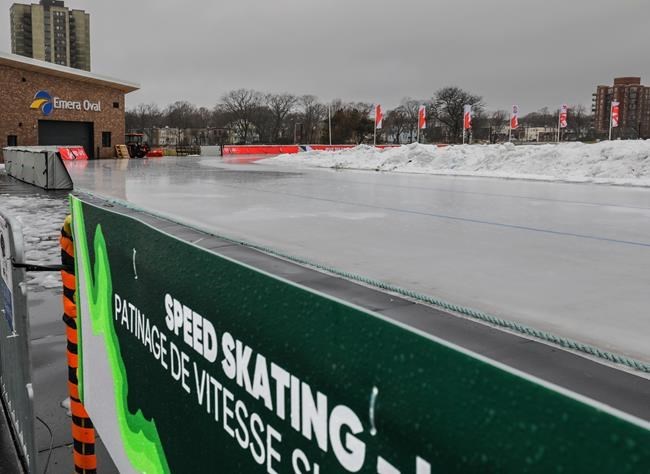HALIFAX — The East Coast's whipsaw shifts between freeze and thaw have complicated life for the Canada Winter Games, as athletes and organizers adapt to what climate scientists say is the new reality of less snow.
Jean-Philippe Le Guellec, the information officer for biathlon at the Games, says in the weeks leading up to the competition, there were questions whether a mild January might force some skiing events to move off Prince Edward Island.
In the end, the skiing venue at North Wiltshire, P.E.I., was helped by a brief cold snap that started in early February and snow-making machinery that had stockpiled snow on cold days since late last year.
However, as events began on Monday, rain was coming down and a temperature of 4 C was forecast for Charlottetown, while speedskating practices at the Halifax oval were delayed by a steady downpour and temperatures of 8 C.
According to Environment Canada, the last time the Island held the winter games in 1991, the average temperature was -11 C and 88 centimetres of snow had fallen during January. This year, the average temperature in January was -2 C — the warmest since 1953 — and 58 cm of snow fell during the month.
Le Guellec, a former Olympian and World Cup racer, said that the gradual fade of snowy winters in large parts of the Northern Hemisphere has his sport worried both domestically and on the international scene.
"They (P.E.I.) didn't have much snow until last week and there was a big concern about holding the event. They had a fallback plan to go to Charlo, N.B., which is four hours away," he said in an interview from Charlottetown the day before the biathlon — a sport combining cross-country skiing and target shooting — was set to begin.
According to "Canada's Changing Climate" — the 2019 summary of federal climate science — over the past three decades, global warming has led to a decrease in the proportion of Canadian land covered by snow. The document says there are "significant reductions in seasonal snow accumulation" projected across Southern Canada in the decades ahead, including the Atlantic region.
"Climate change is very real," Le Guellec said. "We see it winter after winter."
For some skiers, it's meant long hours in December and January training on asphalt surfaces, using carbon tipped poles and roller skis that substitute for cross-country skiing on snow.
It's become common for Nova Scotia athletes and their families to drive round trips as long as 1,000 kilometres, seeking snow to train and race on to prepare for the Games, coaches and athletes say.
Ewan Miner, 15, a Nova Scotia biathlete who races this week, describes the long trips as an "inconvenient" but an increasingly normal part of his sport. "(Climate change) will have an effect on the availability of venues for our sport. But there are still people willing to drive the six hours or seven hours to train," he said in an interview on Sunday.
However, Peggy Falkenham-Boutilier, the team's coach, said her association is starting to seriously consider what biathlon looks like without snow in Nova Scotia.
"In this last two years we've re-evaluated and we're asking ourselves the question, what should a shooting range look like? Should it be a roller skiing facility that allows us to have our loops on asphalt?" she said.
Daniel Scott, a professor of geography and environmental management at the University of Waterloo, said the challenges at the Canada Games are reflecting wider trends. "This is something the current and future generations of snow sports athletes will have to get used to and adapt to as best as possible," he wrote in an email on Monday.
He said interviews he conducts suggest the prime concern of the athletes and winter sports enthusiasts is that as local conditions decline, "we lose an important pipeline to the next generation of snow sports athletes."
The researcher said that like most sectors of society, there is a bias in sports circles towards excessive optimism about climate change, but he says predictions of doom aren't helpful either, as both attitudes can become paralyzing.
"We do need to be realistic about future climate outcomes and plan accordingly. I don't see that in the world of sport yet," he wrote.
The public relations team at the Canada Winter Games said a race site official for biathlon was unavailable for comment and sent written comments Monday to indicate the races were proceeding, and there are "no concerns with conditions" at the venue.
"The host society is currently using the alpine snow-making system to make and stockpile snow so it can be harvested and placed at the nordic venue, if required, to provide cross-country skiing an expanded trail network," they wrote.
Meanwhile, the swings of the Maritime winter were expected to continue this week, as Environment Canada forecast temperatures to shift from rain on Monday to a low of -11 C in Charlottetown by week's end.
This report by The Canadian Press was first published Feb. 20, 2023.
Michael Tutton, The Canadian Press



